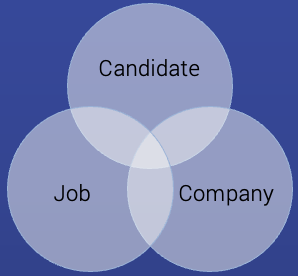The Sweet Spot
The place in which you and your skills, the job and the requirements, and the company and its vision intersect is known as the sweet spot. The more you’re able to focus in on this sweet spot during your interview preparation, the stronger you’re going to be in that interview. Focusing on the needs and preferences of the company can help you identify the aspects of your work history and background that will best serve your future employer.

Research the Company
In order to understand the company’s needs, there’s a few things you will need to identify and research in advance. Start by researching the company’s mission and goals, as it is very important that you have an understanding of what they stand for and what they find valuable. Is it customer service? Saving money? A great company culture? Knowing a company’s values beforehand will help shape your interview answers to reflect how you best meet their needs. Also be sure to research the person or people with whom you will be meeting by checking out their LinkedIn profiles or Googling their name, and definitely jot down any commonalities between them and yourself as a way to establish some common ground.
Bring a list of questions about the company and don’t forget to bring your references!
Interview Question Styles
It is important to familiarize yourself with different question styles and how to answer them. Here are some common question styles you might get asked in your next interview:
- Standard Questions. “What is your greatest strength?” These questions focus on facts like background information, work history, education, strengths and skills, etc.
- Behavioral Questions. “Can you tell me about a time you made a sale?” The interviewer is looking for behaviors that demonstrate competencies in your responses, so make sure to be specific and show how you did something.
- Case Questions: “Sell me this pen.” These questions are also focused on your competencies, but there is one key difference between a behavioral interview question and a case question. One asks you to describe a situation that has happened to you or tell about a time in your past, and the latter asks you to put yourself into a future scenario and let the interviewer know how you would solve a problem in their company. Case questions are focused on what future competency you would pull from your toolkit in order to address the given problem.
- Stress Questions: “What would you do if you went home and found a penguin in your freezer?” Becomingly increasingly popular, these interview questions focus on your ability to demonstrate grace under fire right during the interview! The interviewer is not looking for an actual answer, but rather your ability to talk about your process when faced with an unusual or stressful situation.
Common Roadblocks
On a final note, let’s review some common hurdles you might face on the big day and how you can navigate these roadblocks and perform your best.
- Initial Nerves. Many of us have a difficult time just staying calm and those first moments of an interview a very stress and nerve ridden process, I encourage you to make sure that you’re arriving early and take a nice deep grounding breath before stepping into that room.
- Self-promotion. Most of us have a difficult time referencing ourselves, feeling like we sound big-headed, or wondering if we’re too confident as we talk about our different skills, experience, and our accomplishments. To avoid the fear of self-promotion, I encourage you to step forward into a confident place and to connect with the value you’re bringing to the conversation and your future company. A quick way to do this is to speak from a team perspective as often as you can. When answering a question, speak in terms of “we” and not “I,” and highlight teamwork and results.
- Over-talking. Some of us have an issue with over talking, we know that we tend to ramble on or give too much information. In the event that you do this or if you think out-loud a bit too much, make sure that you take the time to stop and ask “Would more detail be helpful?” during the interview process. You can also ask, “Would you like to hear more about A or B?” allowing the interviewer to stay in control of the conversation, and to dictate which aspects of your response they’d like to learn more about.
- Bad Mannerisms. Maintain strong eye contact, continue to take some deep breaths throughout the conversation, and be sure to not fidget with your hands. Be prepared with your resume and references, and while it is ok to sip water, make sure it’s not done excessively. And finally, smile. Whether in person, on the phone, or on a video interview, your voice tone will change as a smile comes across your face and you will inherently sound more approachable and personable.


